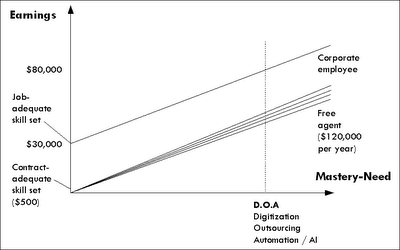Are you a threat to your employer?
 The more money you earn as an employee, the more you become a threat to your employer.
The more money you earn as an employee, the more you become a threat to your employer.This is simply because to maximize profit, capitalists (business owners) MUST keep wages as low as possible.
(In the diagram above, you can see that at one point, an employee (say, an engineer) is costing the company so much ($80,000) that they're seriously considering outsourcing his job to India. If it's not outsourcing, it can be digitization or automation or expert systems. Whatever it is, employers will resort to such labour-reducing ploys because they NEED to keep wages (costs) down for shareholders' sake).
Furthermore, the more unique and irreplaceable and talented you are, the more you ALSO become a threat to your employer.
That's because employers want stability. They don't want star employees who can decide, at any moment, to jump ship and join another company. This would disrupt operations and profit-making.
So on the one hand, you have your human capital. On the other hand, employers have structural capital (equipment, procedures, work methods, software applications and the company-specific way they are used and leveraged, intellectual property, etc.).
The key is for employers to help you build your human capital, but ONLY insofar as it helps you do a better job at the company, NOT anywhere else (such as for competitors, should you decide to jump ship).
All of this is commonsense, yet most people don't think about it in those terms because most people have never been business owners.
What this means, in fact, is that you can never develop a strategic skill set (which would dramatically expand your career opportunities and professional horizons) by relying on the information and training provided by your employer.
The best that employers can do is provide job-specific training. They can NEVER provide career-relevant training, for that would increase your mobility and market value -- two powerful factors that will increase the risk that you leave the company.

<< Home